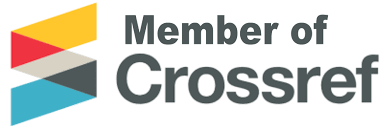Analyze Modified Extended Information Technology Continuance toward Continuance Intention of Administration Information System
Abstract
This study emphasizes the importance of the role of technology in the form of information systems in an educational service institution by using an information system application that is used by the academic community on a daily basis. The purpose of this study is to analyze post-usage usefulness and facilitating conditions through or not through satisfaction to achieve continuance intention related to Administrative Information Systems (SIA) at the Faculty of Economics, Universitas Sarjanawiyata Tamansiswa, Yogyakarta. This study uses a modification of the Extended Information Technology Continuance (ITC). This study uses AMOS 22 path analysis and a total sample of 343 students in accounting and management programs. The results showed that all hypotheses were accepted except for the direct effect of facilitating conditions toward continuance intention. These results strengthen the impact of satisfaction on continuance intention regarding the practice of using technology. The implication of the results indicates that the use of available information system applications, although satisfactory, must still be monitored and developed in order to ensure continued user satisfaction.
Keywords
Full Text:
PDFReferences
Amin, M., Rezaei, S., & Abolghasemi, M. (2014). User satisfaction with mobile websites: The impact of perceived usefulness (PU), perceived ease of use (PEOU) and trust. Nankai Business Review International, 5(3), 258–274. https://doi.org/10.1108/NBRI-01-2014-0005
Bhattacherjee, A. (2001). Understanding information systems continuance: An expectation-confirmation model. MIS Quarterly: Management Information Systems, 25(3), 351–370. https://doi.org/10.2307/3250921
Bhattacherjee, A., Perols, J., & Sanford, C. (2008). Information technology continuance: A theoretic extension and empirical test. Journal of Computer Information Systems, 49(1), 17–26. https://doi.org/10.1080/08874417.2008.11645302
Brown, S. P., & Person, R. A. (2013). Antecedents and consequence of salesperson job satisfaction: Meta-analysis and assessment of causal effects. Journal of Marketing Research, 30(1), 1–20. https://doi.org/10.2307/3172514
Davis, F. D. (1989). Perceived usefulness, perceived ease of use, and user acceptance of information technology. MIS Quarterly: Management Information Systems, 13(3), 319–340. https://doi.org/10.5962/bhl.title.33621
Davis, F. D. (2013). Perceived usefulness, perceived ease of use, and user acceptance of information technology. IT Usefulness and Ease of Use, 13(3), 319–340. https://doi.org/https://doi.org/10.2307/249008
DeLone, W. H., & McLean, E. R. (2003). The DeLone and McLean model of information systems success: A ten-year update. Journal of Management Information Systems, 19(4), 9–30. https://doi.org/10.1080/07421222.2003.11045748
Hamidi, F., Meshkat, M., Rezaee, M., & Jafari, M. (2011). Information technology in education. Procedia Computer Science, 3, 369–373. https://doi.org/10.1016/j.procs.2010.12.062
Heale, R., & Twycross, A. (2015). Validity and reliability in quantitative research. Evidance-Based Nursing, 18(3), 66–67. https://doi.org/10.1136/eb-2015-102129
Hinton, P. R., McMurray, I., & Brownlow, C. (2014). SPSS Explained. In SPSS Explained. https://doi.org/10.4324/9781315797298
Istianingsih, & Utami, W. (2009). Pengaruh kepuasan pengguna sistem informasi terhadap kinerja individu (Studi empiris pada pengguna paket program aplikasi sistem informasi akuntansi di Indonesia). Seminar Nasional Akuntansi XII, 1–47.
Jogiyanto. (2008). Metodologi penelitian sistem informasi. Yogyakarta: ANDI Offset.
Juvelin, L., Wulani, F., & Amrullah, A. A. (2018). Influence of post-usage usefulness, self-efficacy and satisfaction towards continuance intention of T-Cash. Research Management and Accounting, 1(1).
Keen, P. G. W. (1980). MIS research: Reference disciplines and a cumulative tradition. Proceedings of the First International Conference on Information System, 9–18. Retrieved from http://aisel.aisnet.org/icis1980/9
Lee, I., Choi, B., Kim, J., & Hong, S. J. (2007). Culture-technology fit: Effects of cultural characteristics on the post-adoption beliefs of mobile internet users. International Journal of Electronic Commerce, 11(4), 11–51. https://doi.org/10.2753/JEC1086-4415110401
Lee, M.-C. (2010). Explaining and predicting users’ continuance intention toward e-learning: An extension of the expectation-confirmation model. Computers and Education, 54(2), 506–516. https://doi.org/10.1016/j.compedu.2009.09.002
Limayem, M., Hirt, S. G., & Cheung, C. M. K. (2007). How habit limits the predictive power of intention: The case of information systems continuance. MIS Quarterly: Management Information Systems, 31(4), 705–737. https://doi.org/10.2307/25148817
Lin, H. H., & Wang, Y. S. (2006). An examination of the determinants of customer loyalty in mobile commerce contexts. Information and Management, 43(3), 271–282. https://doi.org/10.1016/j.im.2005.08.001
Phuong, N. N. D., & Trang, T. T. D. (2018). Repurchase intention: The effect of service quality, system quality, information quality, and customer satisfaction as mediating role: A PLS approach of m-commerce ride hailing service in vietnam. Marketing and Branding Research, 5(2), 78–91. https://doi.org/10.33844/mbr.2018.60463
Rezaei, S., Shahijan, M. K., Amin, M., & Khairu, W. (2016). Determinants of app tores continuance behavior: A PLS path modelling approach. Journal of Internet Commerce, 15(4), 408–440. https://doi.org/10.1080/15332861.2016.1256749
Susanto, A., Chang, Y., & Ha, Y. (2016). Determinants of continuance intention to use the smartphone banking services. Industrial Management & Data Systems, 116(508–525). https://doi.org/10.1108/IMDS-05-2015-0195
Thompson, R. L., & Higgins, C. A. (1991). Personal computing: Toward a conceptual model of utilization. MIS Quarterly: Management Information Systems, 15(1), 125–142. https://doi.org/10.2307/249443
Vehkalahti, K., Puntanen, S., & Tarkkonen, L. (2006). Estimation of reliability: a better alternative for Cronbach’s alpha. Retrieved from http://www.researchgate.net/profile/Kimmo_Vehkalahti/publication/267793144_Estimation_of_reliability_a_better_alternative_for_Cronbach’s_alpha/links/54fffbd10cf2eaf210bcd2d7.pdf
Venkatesh, V., & Bala, H. (2008). Technology acceptance model 3 and a research agenda on interventions. Decision Sciences, 39(2), 273–315. https://doi.org/10.1111/j.1540-5915.2008.00192.x
Venkatesh, V., Morris, M. G., Davis, G. B., & Davis, F. D. (2003). User acceptance of information technology: Toward a unified view. MIS Quarterly: Management Information Systems, 27(3), 425–478. https://doi.org/10.2307/30036540
Venkatesh, V., Thong, J. Y. L., Chan, F. K. Y., Hu, P. J. H., & Brown, S. A. (2011). Extending the two-stage information systems continuance model: Incorporating UTAUT predictors and the role of context. Information Systems Journal, 21(6), 527–555. https://doi.org/10.1111/j.1365-2575.2011.00373.x
Vranesevic, T., Vignali, C., & Vignali, D. (2002). Culture in defining consumer satisfaction in marketing. European Business Review, 14(5), 364–374. https://doi.org/10.1108/09555340210444211
Wang, C.-S., Jeng, Y.-L., & Huang, Y.-M. (2010). What influences teachers to continue using cloud services? The role of facilitating conditions and social influence. The Eletronic Library, 34(1), 1–5. https://doi.org/https://doi.org/10.1108/EL-02-2016-0046
DOI: https://doi.org/10.35314/inovbiz.v9i2.1975
Refbacks
- There are currently no refbacks.
Copyright (c) 2022 Lusia Tria Hatmanti Hutami

This work is licensed under a Creative Commons Attribution-NonCommercial-ShareAlike 4.0 International License.
This Journal has been listed and indexed in :
Copyright of Jurnal Inovasi Bisnis (p-ISSN : 2338-4840, e-ISSN : 2614-6983)

Inovbiz: Jurnal Inovasi Bisnis is licensed under a Creative Commons Attribution-NonCommercial-ShareAlike 4.0 International License.
Editorial Office :
Pusat Penelitian dan Pengabdian kepada Masyarakat
 Politeknik Negeri BengkalisÂ
Jl. Bathin alam, Sungai Alam Bengkalis-Riau 28711Â
E-mail: inovbiz@polbeng.ac.id














